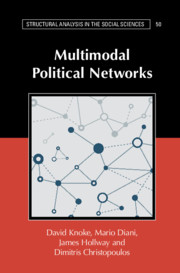Book contents
- Frontmatter
- Contents
- Figures
- Tables
- Preface
- 1 Politics, Communities, and Power
- 2 Multimodal Graphs and Matrices
- 3 Agency, Influence, Power
- 4 Political Communities in a Policy Network
- 5 Individuals in Associations
- 6 Agents and Events in Collective Action Fields
- 7 Nations Trading and Fighting
- 8 Legislative Influence
- 9 The Potential of Multimodal Political Networks
- Appendices
- References
- Index
7 - Nations Trading and Fighting
Published online by Cambridge University Press: 12 May 2021
- Frontmatter
- Contents
- Figures
- Tables
- Preface
- 1 Politics, Communities, and Power
- 2 Multimodal Graphs and Matrices
- 3 Agency, Influence, Power
- 4 Political Communities in a Policy Network
- 5 Individuals in Associations
- 6 Agents and Events in Collective Action Fields
- 7 Nations Trading and Fighting
- 8 Legislative Influence
- 9 The Potential of Multimodal Political Networks
- Appendices
- References
- Index
Summary
Chapter 7 examines nations trading and fighting. It begins by reviewing networks-related research in three fields: world systems, world polity, and international relations. We proposed two hypotheses from these fields: the trade–conflict hypothesis that there is an inverse relationship between trade and conflict; and the democratic peace hypothesis that democratic states are less likely to engage in militarized disputes. We investigate both hypotheses using data collected by the Correlates of War project from 2001 to 2010. Analysis of a 2-mode network of bilateral trade ties and memberships in intergovernmental organizations identifies four communities. A 2-mode network of diplomatic exchanges and memberships in military alliances also finds four communities. To test the hypotheses, we use Quadratic Assignment Procedure to regress militarized interstate disputes (MIDs) between dyads on trading communities, alliance communities, and types of governmental regimes. Nations belonging to the same international trade community were more likely to engage in MIDs. Democratic states were not less likely to fight one another, nor were authoritarian regimes more likely to experience MIDs. But, conflicts were very much more likely to erupt between democratic and authoritarian states.
Keywords
- Type
- Chapter
- Information
- Multimodal Political Networks , pp. 158 - 179Publisher: Cambridge University PressPrint publication year: 2021

